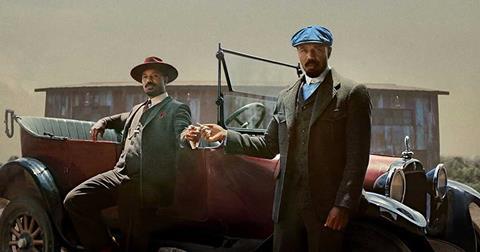Sinners is a fun, stylish, vampiric horror that highlights racial justice issues and has great music. Christians may not like how the Church is portrayed, says Jonty Langley, but if that’s the case, they should ask themselves why it is perceived that way

From the first half hour of Ryan Coogler’s latest film, Sinners, you’d be forgiven for assuming it’s a generational family saga. Or a period-piece crime flick. With its Southern Jim Crow setting, you might think it’s a social justice drama.
But the promo material makes it look like a horror. And it is. As well as a family drama and a social justice crime flick. And a musical.
Its star, Michael B Jordan, plays twin brothers, Smoke and Stack Moore, poor lads made good in 1920s Chicago, who return to Mississippi with pockets full of cash and a dream to start a black-owned business in America’s racist South. The twins are distinct characters and yet inextricably linked, and so it is with the genres Sinners could be said to occupy.
Sinners is a vampire film, taking place against a backdrop of social and political hardship and injustice, with a plot driven by the complicated relationships the protagonist brothers left behind – and to which they have returned – all explored in the extended establishing scenes before the darker ‘action’ begins.
When it does, it is fast-paced, inventive and bloody. Sinners is undoubtedly a horror film at heart, but more From Dusk Till Dawn meets Midnight Mass than Twilight or Nosferatu. There are echoes of Angel Heart here, too, with bayou magic and Hoodoo spirituality naturally playing a part in a film whose heartbeat is the Blues - but without the 80s classic’s diabolical edge.
Religion and race
Religion is present in this film, but despite the title, it is not its core. This is evident in the choices the movie makes about which parts of the vampire lore to keep and which to discard or reframe (always part of the fun in a vampire flick).
Sinners retains the old-school conceit that vampires cannot cross a threshold unless invited in, for instance, but crosses don’t scare them and Christian prayers hold no terror for these undead.
Sinners is about Blues-loving brothers facing vampires, but it’s really about race. And that’s where the music comes in. The Blues is portrayed as a link between Africa, the enslaved diaspora and contemporary Black creative affluence, a symbol of Black power and self-expression. In this way, Celtic Folk music and Roots Country stand in for whiteness among the vampires.
White supremacy is not just sinful but evil, and the demonic inhabits power structures that oppress
But Sinners doesn’t leave things so simple. People of colour are drawn into the ‘white’ music, which is every bit as powerful as the Blues, and seemingly more accommodating. And that’s at the beating (or unbeating) heart of the film.
The dilemma for Black Americans, in this film’s universe, seems to be the choice between assimilation and authenticity, between staying true to ancestral culture – and being powerless against racist violence – or surrendering that culture to a homogenising force. “I want your music and I want your stories,” the charismatic vampire says, as he offers liberation and power.
The choice of whether to give in to a life that is undeniably easier but also a cultural death, or to fight white supremacy and lose is a bleak worldview, and yet the film vibrates with hope and strength of spirit. Whether in the enjoyably cathartic annihilation of Klansmen or the transcendent power of connecting one’s creative self to those who have gone before, Sinners offers an assertion that individuals can find transcendence in authenticity, creativity and love.
Christianity and culture
The fact that Christianity in the film is depicted as an almost monastic retreat from creative fulfilment and the fight for justice may not please Christians, particularly those excited to see and hear the incredibly talented Gospel-adjacent singer Miles Caton in a crucial supporting role. But if we would prefer to see Christianity depicted as liberating, creatively fulfilling and engaging dynamically with the world of culture, politics and justice, perhaps we need to ask ourselves why that is not how the Church is perceived anymore, and repent.
Sinners offers an assertion that individuals can find transcendence in authenticity, creativity and love
Vampire films and horror generally are often spaces more open to Christian spirituality, the power of prayer and the reality of the supernatural than other filmic universes. But Sinners does not allow the Church to play the hero on film, while in reality supporting the reanimation of fascism worldwide. That doesn’t mean that this Southern film, with its Gospel echoes, has nothing of the Pentecostal about it, though.
Sinners recognises what many Christian creations refuse to: that white supremacy is a spiritual problem: not just sinful but evil, and that the demonic inhabits power structures that oppress and demand submission as a condition of equality. It also lays bare the reality that if people are forced to choose between their destruction and violent survival, they may not choose the way you want them to.
Sinners is also just fun. Stylish, inventive, full of heart and incredibly cool.







































No comments yet